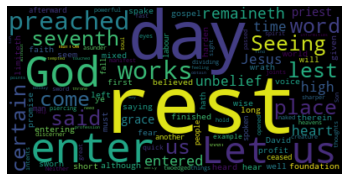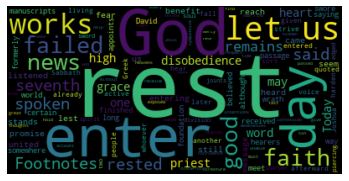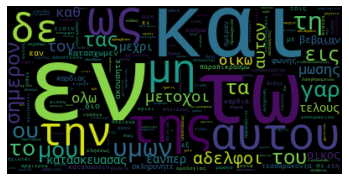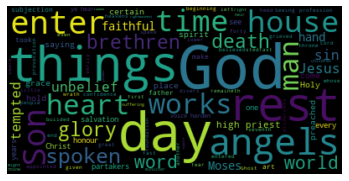The version used is ESV
Titles for God
- Father - God: 4,9,10,12;
- Son - Jesus: 14; Great High Priest
Actions of God, the Father
- 1: He provides rest,
- 3: sworn in wrath & spoke
- 4: spoke of the 7th day, rested from all works
- 7: advised not to harden our hearts
Actions of God, the Son
- 8: didnt give them rest
- 14: passed into heavens
- 15: sympathizes with our weakness, was tempted but refrained from sinning
Actions of Holy Spirit
Actions of man
- fear of not entering his rest
- heard the good news in the wilderness, fell away
- believe and enter rest
- Joshua didnt give them rest
- hold fast our confession
- have confidence and draw near
Commands
- 1 fear that we fail to reach His rest
- 2 be united by faith with those who listened
- 3 believe and enter the rest
- 7 hear God's voice and not harden our heart
- 10 rest from our works
- 11 strive to enter the rest
- 14 hold fast to our confession
- 16 with confidence draw near
Repeating words
Wordcloud of the KJV text

and using ESV text

Here is the Greek Textus Receptus, without any stop words.

Here is the word cloud for words from chapters 1-4. Uses some common verbs and pronoun as stop words.

Keywords
Outside of God, Jesus
- rest
- good news
- disobedience
- grace
Figures of Speech
Again most of the metaphors are also physical and spiritual in addition to the metaphysical.
- 1: metaphor rest (using Katapauses), resting place - heavenly blessedness in which God dwells
- 3: foundation of the world, beginning/eternal; wrath of God: anthropopathic
- 4: God rested: anthropopathic
- 7: harden your hearts: metaphor for disobedience
- 12: two edged sword: metaphor for the sharpness and utility it brings, division of soul and spirit: metaphor to discern our will and actions, thoughts and intentions
- 13: naked and exposed
- 16: throne of grace
Lists
- 12: list of twos: soul/spirit, joints/marrow, thoughts/intentions
Cause & effect
- 1: promise of entering His rest -> fear so as to reach it
- 1: dont fear -> fail to enter into His rest
- 2: not united in faith -> good news did not benefit them
- 3: believe the good news and united by faith -> enter into His rest
- 3: not believe and not be united by faith -> not enter His rest
- 6: disobedience -> failure to enter His rest
- 7: hear His voice -> not harden our hearts
- 8: God spoke of another day -> Joshua didnt give them rest
- 8/9: God spoke of another day -> reamins a Sabbath rest for us
- 10: God rested from His works -> we rest from our works
- 10: we enter God's rest -> we rest from our works
- 11: strive to enter His rest -> not fall by disobedience
- 12: two edged sword -> pierces soul/spirit, joints/marrow, thoughts/intentions
- 13: God sees all -> we must give account
- 14: Jesus has passed thru heavens -> hold fast to our confessions
- 15: Jesus was tempted -> He is able to sympathize with our weakness
- 15: Jesus is without sin -> our high priest
- 16: with confidence near His throne -> receive mercy and grace
Compare/Contrasts
There is a theme of comparing and contrasting through the whole chapter:
- we in todays time are compared to Israel in the wilderness
- contrast within Israel some entered His rest thru faith and disobedience and some who were disobedient
- Joshua's rest contrasted with God's rest, harkening back to Joshua leading them to the promised land
- Jesus' temptations are compared to ours for bolstering our faith
- Jesus' temptations are contrasted with ours in that He didnt sin
God's emotions: Anthropopathism
My view is that Yah is above emotions and the feelings, we men feel. Although the language of feelings and emotions are used through out the Bible in connection with Yah, we have to reconcile that with the fact that our finite brain cannot comprehend the full nature of our Creator. These are but words with meaning we can comprehend to describe to us His intent and character. The figure of speech is that of anthropopathic, ascribing to human emotions.
Although there are several verses in the Bible attributing human emotion language to Yah, we need to accommodate those with the below passages:
- [James1:13] Let no one say when he is tempted, “I am being tempted by God,” for God cannot be tempted with evil, and he himself tempts no one.
- [Num23:19] God is not a man, that he should lie; neither the son of man, that he should repent: hath he said, and shall he not do it? or hath he spoken, and shall he not make it good?
- [Titus1:2] In hope of eternal life, which God, that cannot lie, promised before the world began;
- [Isa27:4] I have no wrath. Would that I had thorns and briers to battle! I would march against them, I would burn them up together.